Farmer John Writes: Higher Pay, Less Payroll
Harvest Week 16, September 21st – 24th
Your Box This Week – Saturday, September 24th
Please note: this summary is written before we pack your box—be aware that some guesswork is involved. At times, a bit of improvisation is required for selecting the contents of your share. As always, be sure to thoroughly wash all of your vegetables.
- Acorn Squash
- Pie Pumpkin or Baby Blue Hubbard Squash
- Carrots
- Broccoli
- Bunched Hakurei Turnips
- Chinese Cabbage (maybe)
- Lettuce
- Baby Choi
- Curly Parsley
Crop Update
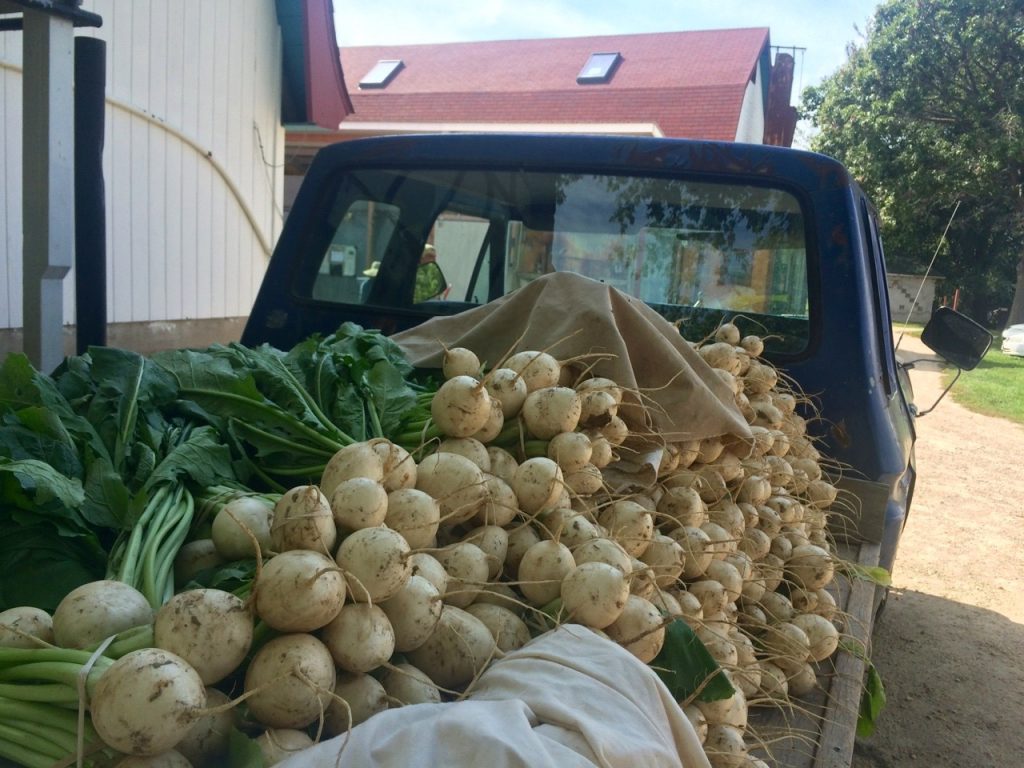
Hakurei Turnips
Turnips: nice crop. We harvested the turnips a little early. If we left them in the field to grow up fully, worms start to chew on the roots. We lost last spring’s and last fall’s turnips to worms. We were proactive in harvesting them this fall, plus the worms procrastinated in their dining on our turnips.
Carrots: one of our best crops ever
Potatoes: potato yields are unpredictable. One year, they might yield half as much as the previous year—a mystery. This year, the yields are good, not spectacular. Quality is excellent.
Kohlrabi: fabulous crop
Choi & Chinese Cabbage: large & luscious
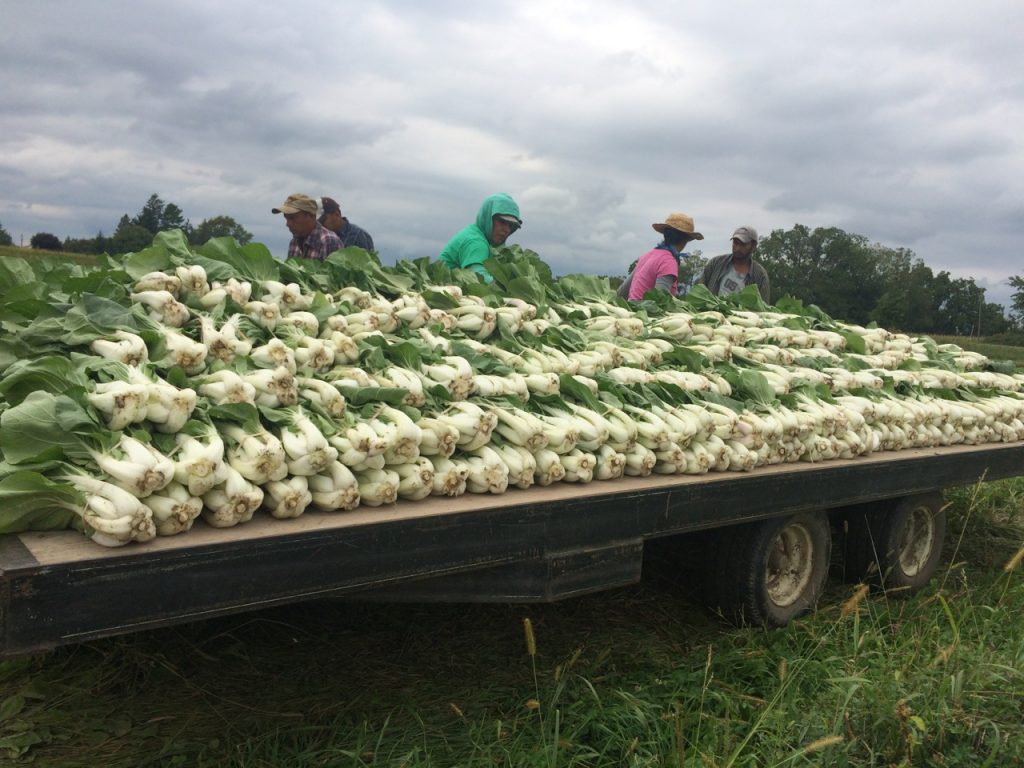
Joi Choi and Field Team
Broccoli and Regular Cabbage: disappointing. Lovely looking cabbage and broccoli heads often present quality problems when we examine them closely this fall—a spike of decay shoots from the stems through the centers of the heads. It’s not a total loss, but a substantial loss of crops that usually do very well. I have never seen this disease before. The fall brassicas were planted on time into lovely, fertile soil and looked super all season. When scrutinizing these crops upon harvest, many presented this disease.
Brussels Sprouts: seem to be having a similar problem as the broccoli and cabbage. I’ll write more about the Brussels sprouts soon.
Winter Squash: a splendid harvest, the best in years
Eggplant: a strange year—nicest plants I’ve ever seen, but with few flowers and fewer eggplants. The eggplants are next to the peppers which flowered and yielded beautifully. I have seen eggplant crops tarry and then, end of September, just before the frosts, they produce a flush of eggplants. The eggplant is now flowering profusely; maybe we’ll have a flush of eggplant before frost.
Lettuce: after a summer lull, lettuce is coming on strong, looking great
Onions: mediocre crop; nice looking onions but lots of rot both in the fields and in storage.
Garlic: there should be enough garlic for a lovely bulb in the box for two consecutive weeks during the main season plus in one or two boxes of the extended season.
Daikon Radishes: lovely. I think we’ll also bunch the Daikon greens for a culinary adventure
Summary
You can see above how crops can vary in yield and quality. We’ve had a super fantastic year with both yields and quality overall. Any setbacks in some crops have been more than offset by extraordinary abundance in other crops. I suppose most of our shareholders know that I over-plant, to make sure that the boxes will be full, even if we have yield disappointments in certain crops.
Sorry–Extended Season Shares are no Longer Available
The below average yields of broccoli, cabbage and Brussels sprouts have made me close the door on extended season shares. Of course, this is a disappointment as we near the conclusion of such an abundant season. Farming ennobles, empowers, and humbles.
Our Fall Field Day
Saturday was a super fun Field Day—great turnout, delicious food, perfect weather, special hayride to the Learning Center woods and overnight facility on the Kinnikinnick Creek—all great!
My young friend Joseph Haas attended with his lovely twin sisters and his parents. Joseph has just started middle school. You might recall former Farm News references to Joseph; he is very interested in Angelic Organics, has watched The Real Dirt on Farmer John several times, has written a short version of my biography; has outlined a possible TV series for Angelic Organics, etc. I asked him last Saturday what he had been up to, and he said he has been reading Rudolf Steiner’s 8 lectures on agriculture, The Agriculture Course, which is the foundation for Biodynamic farming. I have read these lectures three or four times. I find them inspiring, yet quite challenging. I asked Joseph what he has gotten out of the book and he proceeded to give Haidy and me a concise and most insightful presentation on the first few chapters. Wow! Then lunch was over, and it was time for more hayrides.
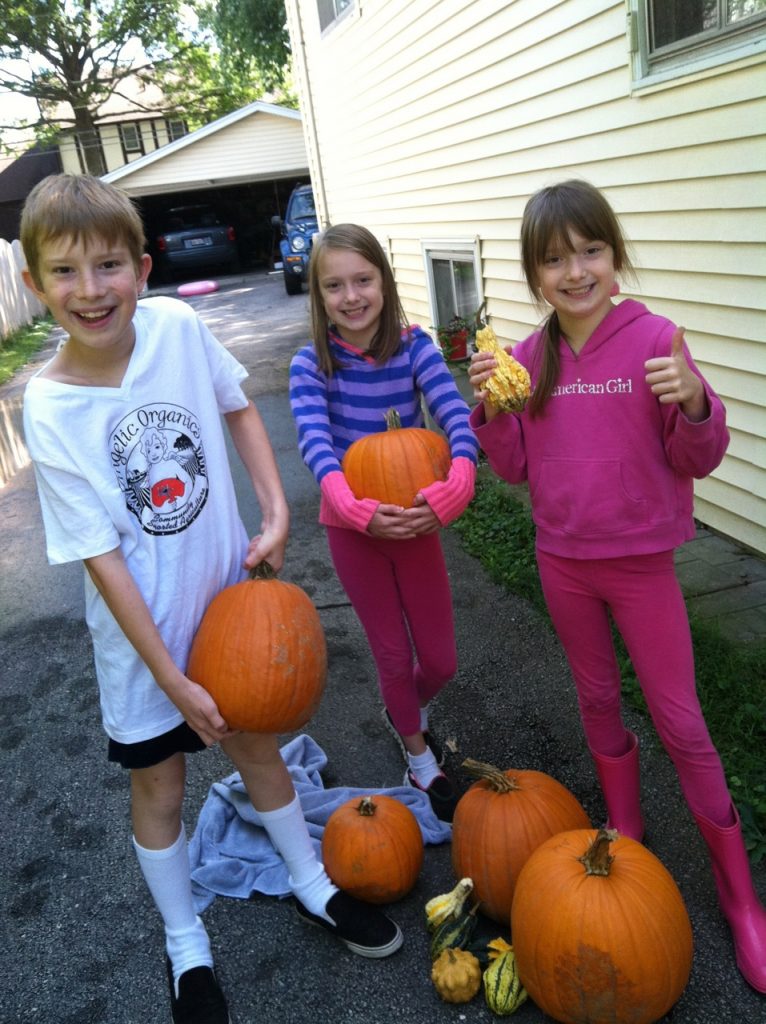
Fall, 2016 at home after the Farm Field Day: Rudolf Steiner scholar Joseph Haas
with twin sisters Katherine and Kaitlyn
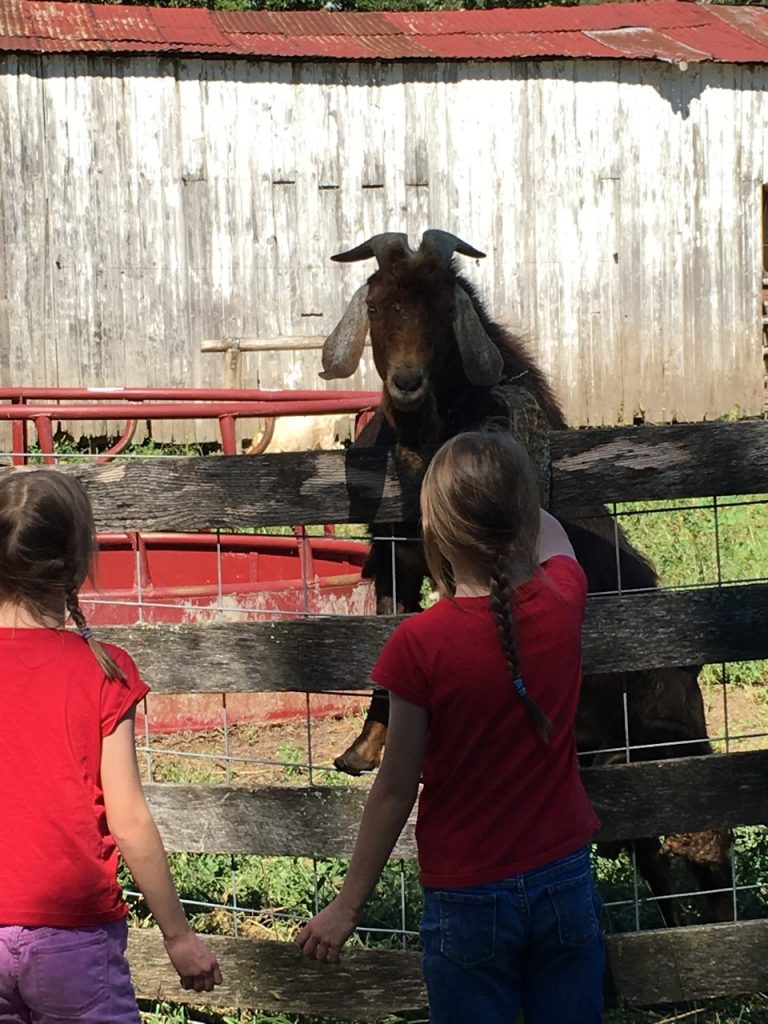
Learning Center goat and twin sisters Kaitlyn and Katherine of Rudolf Steiner scholar Joseph Haas
Farm Developments in 2016
In the previous three issues of Farm News, I wrote about developments at Angelic Organics this year that have combined to make for a better season overall: Our Secret Growing Manager, how The Farm Whispers, Unpacking the Mystery of the Pack, and this week, I reveal the fourth development.
Development #4 Higher Pay; Less Payroll
Some people don’t like to work—you probably know this. I try to figure out who these people are ahead of time and not hire them to work in our fields. Some have ended up on the field crew, anyway. They might like the work for the first few days and might not. After the first few days, it is apparent who doesn’t like to work, or at least, who doesn’t like to work in our fields.
Often, the people who don’t like to work and who don’t work hard–these are usually the same people—have told me, and especially told one another while leaning on their hoes, that they would work harder if they got paid more. This happened a lot last year.
I said, “notice the people who have been working here on the farm for 10, 15, 25 years. They worked just as hard at their low, starting pay as they work now. They might work smarter now, because they are more experienced, but they don’t work harder now; they’ve always worked this hard and this conscientiously.”
“We deserve more pay. Then we would work harder.” This is how it often goes when trying to reason with people—I say what’s so, and what’s so doesn’t register as a part of the exchange. It’s as though I never said it.
“If you received more pay,” I continued, “you would complain just as much about the work as you do now, and I would be paying you to do that complaining, because you would still be complaining during work. In fact, I would be paying you more per hour to complain than I do now. You really should know this: there are people in this world who will do their best job possible regardless of their pay or any other circumstances. It is their creed, their ethic; doing the best job possible is their signature in life. You can see those people here, the ones who have been here for many years. Their ethic is to do a great job, no matter what.”
I finally decided to raise the starting pay from the minimum wage to $11 per hour. Of course, this meant not hiring anyone who was not worth at least $11 per hour. None of the people who were demanding higher pay, and commiserating while on the clock about their low pay, were eligible for the $11 per hour base pay. They no longer work on the farm.
Now, I have workers who are all worth at least $11 per hour. We have about 3/4 the number of field workers that we had last year, and they get more done earlier and better than the larger team accomplished last year. Timeliness has improved. Weeds are fewer. Crops are better. Pay rates are up. Payroll is down.
Thank You for the Boxes You Have Gifted to Local Food Banks
In Harvest Week 14, Angelic Organics delivered 61 boxes of fresh, organic vegetables and herbs to the Rockford Branch of the Northern Illinois Food Bank and 24 boxes to the Niles Township Food Pantry, an agency of the Chicago Food Depository. This was a total of 85 fresh, healthy, organic, CSA boxes that went to feed those in need. Thank you.
Let us Know
Let Shelly know anything you’d like to share about this week’s box at email hidden; JavaScript is required. Please note the week and day of delivery, your site, when you picked up your box, and any comments about your box.
Please Fold Your Boxes Properly and Return Them
The farm re-uses the vegetable boxes. Flaps are easily torn when the boxes are dismantled improperly, and then the box bottom might later burst open with fresh, organic local produce heading towards the floor. Please carefully flatten your box and return it to your delivery site. If you receive home delivery, place it in the location where your box is delivered.
More from Shareholders
Visit us often at www.facebook.com/angelicorganics where we post exciting farm developments regularly, and shareholders post recipes, reviews tips, and photos. If you’re inspired to write a review, please do. We like knowing how our shareholders are experiencing the season.
Adventures at the Angelic Organics Learning Center
Angelic Organics Learning Center is an exciting and engaging place to learn about food, farming, and caring for the earth. Sign up for a hands-on farm workshop now at www.learngrowconnect.org/events
Warmly,
Farmer John
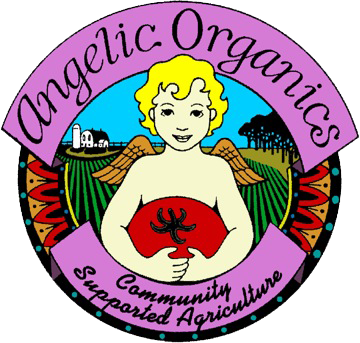
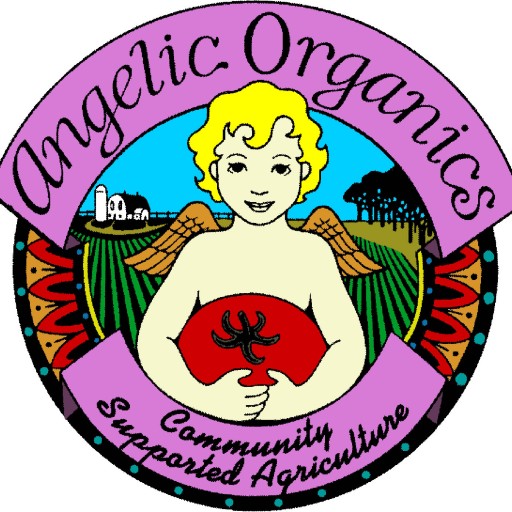
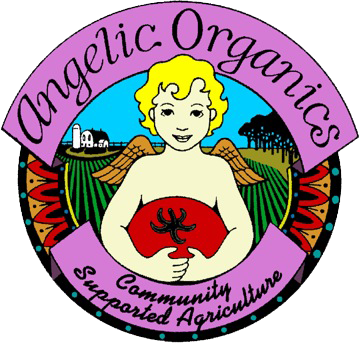

[…] Update Read the Week 16 Farm News for a detailed crop […]